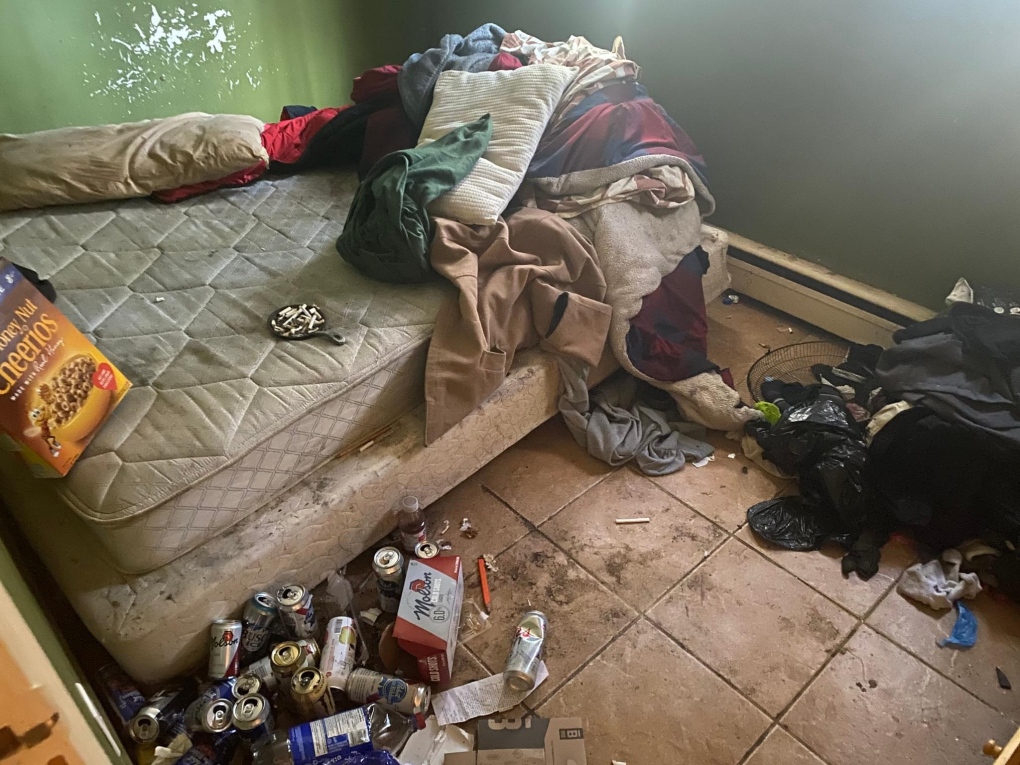Landlords reporting increase in tenants refusing to pay rent or leave
A property management company in Fergus is still cleaning up after they say a tenant trashed one of their units and refused to pay rent.
E-Van Management looks after properties for what it calls “mom and pop landlords.” Jennifer Kamphuis with E-Van Management said in this case, it was a tenant who had lived in the building for years.
“They stopped paying rent last summer,” she said.
“We still did try to work with them – to get their rent paid and kind of keep their tenancy. Ultimately that’s what we want to do, is save tenancies as much as possible. But the tenant never responded to that.”
The company filed for eviction on Aug. 30, 2023. Ontario legislation forces all disputes to go through the Landlord and Tenant Board (LTB).
“Our hearing was Feb. 1. We actually got the order on the 29th of February, which is fast considering how things are lately, but we didn’t actually manage to get the sheriff out until April 10,” Kamphuis said.
In total, it took almost eight months from when the eviction order was filed for the tenant to leave.
 E-Van Management says in the case of the tenant who lived in this unit, it took almost eight months to get an eviction order through the Landlord and Tenant Board. (Submitted/Jennifer Kamphuis)
E-Van Management says in the case of the tenant who lived in this unit, it took almost eight months to get an eviction order through the Landlord and Tenant Board. (Submitted/Jennifer Kamphuis)
It’s not the only case like this that Kamphuis has seen recently.
“We have a young couple who owns a house. Their tenant was just evicted, owes a considerable amount of money, and they were living with their grandparents. They were powerless,” she explained, adding they lost a good tenant in their attached unit because of the actions of the bad tenant.
“It’s caused them anxiety, stress and financial hardship beyond belief.”
Since COVID-19, she has noticed an increase in cases and more backlog at the LTB.
“This is not something that used to be a big issue,” Kamphuis explained.
“Every now and then you’d have somebody that didn’t pay rent, but it would be like – you’d send them a notice and they would either pay or they would leave.”
 Jennifer Kamphuis with E-Van Management says since COVID-19, she's noticed an increase in tenants refusing to pay rent or leave. (Stefanie Davis/CTV Kitchener)
Jennifer Kamphuis with E-Van Management says since COVID-19, she's noticed an increase in tenants refusing to pay rent or leave. (Stefanie Davis/CTV Kitchener)
Puneet Shroff, a real estate lawyer with Sorbara Law, said the firm has also noticed an increase in cases.
“We’re definitely seeing this a lot more nowadays,” he said.
“Rent prices have increased, cost of living has increased and tenants are also more informed about their rights and their ability to stay in the unit until there’s an order from the Landlord Tenant Board.”
Shroff said applications from landlords have to be filled out perfectly, or else it could be back to square one. He said that’s one reason why it’s important to hire a lawyer for this type of dispute.
“Any small defect can be a reason for the LTB to deem it defective and just abolish that proceeding that’s there in front of them,” Shroff said.
CTV News requested an interview with the LTB, but they declined.
In an emailed statement, a spokesperson said there was a “31 per cent increase in the number of applications received in calendar year 2023, to approximately 84,000 new applications.”
The LTB said it has implemented a number of strategies to reduce backlogs, including hiring 46 full-time and 29 part-time adjudicators since May 2023.
“The LTB is projecting that when all of the newly authorized and appointed full-time adjudicators are conducting hearings (expected in June), it will begin to make significant reductions in the backlog,” the LTB said.
Non-payment of rent applications, titled L1 and L9 applications, make up more than half of the LTB’s total applications. The LTB said in early 2023, it was taking eight to 10 months to get a hearing. Now, it takes about four months.
Shreef said even with the reduction in wait times, it’s still costing landlords money.
“At $2,500 a month, that could be over $10,000,” he said.
Online petition
An online petition launched on Feb. 21 titled “We Demand Automatic Eviction Orders for Non-Payment of Residential Rent” has gathered more than 37,000 signature.
One demand from the petition is for a policy that would allow for eviction of a tenant for non-payment of rent to be automatically ordered without a hearing “subject to proof satisfactory to a court being provided of such non-payment of rent.”
Kamphuis said it’s one solution to solving the current backlog at the LTB.
“The tenant can still pay rent to the LTB if there’s a problem with maintenance or something – if there’s a reason they feel that the landlord should not be receiving the rent,” she explained.
“[The LTB] can streamline non-payment of rent applications and then it would give the LTB time to deal with other issues.”
Kamphuis added that most landlords in the province are willing to work with their tenants to overcome hurdles and come to solutions.
“We really want to help good tenants,” she said.
“When you get a bad tenant, it’s a really tough situation for the good tenants. They suffer the most besides the landlords, right? They have to live beside the people that are terrorizing them. But the landlords’ hands are tied.”
CTVNews.ca Top Stories

LIVE UPDATES Critical infrastructure 'successfully protected': Jasper park officials
Jasper National Park officials in an update said all critical infrastructure in the townsite has been 'successfully protected, including the hospital, emergency services building, both elementary and junior/senior schools, activity centre and wastewater treatment plant.'
Canadian Olympic Committee removes women's soccer team's head coach over drone scandal
The Canadian Olympic Committee has removed women's national soccer team head coach Bev Priestman over a drone scandal, according to a press release from the organization.
Yukon woman narrowly escapes bear attack, credits hair clip
A woman in Yukon believes her hair clip helped save her during a bear attack.
Prince William's 2023 salary revealed in new report
Newly released financial reports show that William, the Prince of Wales, drew a salary of $42.1 million last fiscal year, his first since inheriting the vast and lucrative Duchy of Cornwall.
'I was just shocked': Jasper lodge owner on seeing property destroyed by wildfire
On Wednesday night, the owner of Maligne Lodge in Jasper, Alta., was shocked to receive a photo of her business engulfed in flames.
Mary-Ellen Turpel-Lafond likely has Indigenous DNA: report
The Law Society of British Columbia says a DNA test shows a former judge and Order of Canada recipient accused of falsely claiming to be Cree "most likely" has Indigenous heritage.
U.S. authorities have arrested 'El Mayo' Zambada, a historic leader of Mexico's Sinaloa cartel
Ismael 'El Mayo' Zambada, a historic leader of Mexico's Sinaloa cartel, and Joaquin Guzman Lopez, a son of another infamous cartel leader, were arrested by U.S. authorities in Texas on Thursday, the U.S. Justice Department said.
Harris pushes Netanyahu to ease suffering in Gaza: 'I will not be silent'
U.S. Vice President Kamala Harris pressured Israeli Prime Minister Benjamin Netanyahu on Thursday to help reach a Gaza ceasefire deal that would ease the suffering of Palestinian civilians, striking a tougher tone than President Joe Biden.
'She led it the whole way': 18-year-old B.C. woman leads hikers to safety in Jasper National Park
As fire threatened people in Jasper National Park, Colleen Knull sprung into action.
































